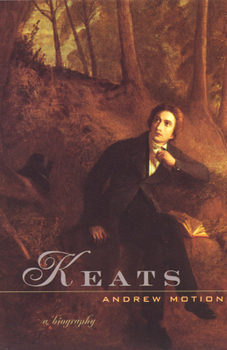Keats
Select Format
Select Condition 
Book Overview
Andrew Motion's dramatic narration of Keats's life is the first in a generation to take a fresh look at this great English Romantic poet. Unlike previous biographers, Motion pays close attention to the social and political worlds Keats inhabited. Making incisive use of the poet's inimitable letters, Motion presents a masterful account. "Motion has given us a new Keats, one who is skinned alive, a genius who wrote in a single month all the poems...
Format:Paperback
Language:English
ISBN:0226542408
ISBN13:9780226542409
Release Date:April 1999
Publisher:University of Chicago Press
Length:656 Pages
Weight:2.15 lbs.
Dimensions:1.8" x 6.1" x 9.3"
Customer Reviews
4 ratings
Useful but heavy-handed
Published by Thriftbooks.com User , 15 years ago
This biography provides quite a lot of information about the later lives of Keat's friends and of his brother George. The portraits of his most of his friends are well-done, and important, since the poet was dependent on them for the constructive criticism he unfortunately never received from the press of his day. Motion perhaps over-emphasizes Keats' political liberalism but this focus helps to locate him in his day and get away from any lingering Victorian ideas of Keats as a poeticizing pet-lamb. Yet to me this biography is not quite satisfying. The affectionate, humorous, spontaneous, brilliantly insightful man who wrote the astonishing letters, Lamia, and the Odes, does not quite come through. Motion's treatment of Keats's social insecurities is a bit heavy-handed; you begin to wonder how could have had the courage to open his mouth in company, let alone be a great conversationalist. Jane Campion has said that this biography is the basis for her film about Keats and Fanny Brawne, Bright Star. I must say that Motion's treatment of their unhappy (at least for Keats) relationship lacks insight. The reputation of Miss Brawne has risen in the last 100 years until she has become almost a feminist heroine, as in Campion's dull movie. But I don't think this conventional and unimaginative girl ever took Keats seriously as a prospective husband. He was poor and his reputation as a poet was doubtful. Her mother had money, and they probably could have married if she had wanted. Fanny was clearly flattered by his attentions---Keats could write a torrid love-letter---but never gave him more than kisses and quite a lot of vexation. Outright rejection might have been more honest, and kinder. Motion attributes Keats's erotic despair to the fact that his mother (also named Fanny) left him as a child, then died when he was 14. Yes, but Keat's last letters to Fanny make for very painful reading. As with most young women of her time and place, she probably knew little about men, despite her apparent sophistication. She seems more like a young woman out of her emotional depth than anything else. Aileen Ward's biography of Keats, The Making of a Poet, gives a better sense of Keats the man. It is out of print but can be found in libraries and probably on-line. That said, Motion's book is better written than the biography by Walter Bate and he clearly loves Keats and his poetry.
Good but not Definitive Bio of Keats
Published by Thriftbooks.com User , 15 years ago
Considering how short the life of John Keats was, it still amazes me that his biographers are able to create such weighty tomes. Andrew Motion's take on Keats, while long, is very through and readable. Motion argues that Keats, if not overtly political as say Shelley, was a poet who did care about the world of power and politics and was not content with poems on nature, the role of the artist etc. It's an interesting argument and Motion makes a strong case. The chief weakness of the book is Motion's habit of straying a bit too far from Keats and focusing on his friends and acquaintances. Now in some cases that is fine (his take on Haydon on Hunt and their influence on Keats is superb) but the reader can be forgiven if he wants to skip paragraphs and even pages on friends and acquaintances of Keats who did little to shape his life or his work. If not quite up to the magnificent biography of Keats by Bates, Motion's book is very good and, with his different take on the tragic poet, useful, even needed.
For Once the Critics are Spot-On
Published by Thriftbooks.com User , 21 years ago
I met Andrew Motion at an Oxford function five years ago. He is a very down-to-earth and humorous man. The accolades that go with this book are, for once, not hyperbole. Well deserved praise for a book that manages to keep the mood of Keats relevant in the modern days.
The Life of a Poet as Seen Through the Eyes of a Poet
Published by Thriftbooks.com User , 26 years ago
Andrew Motion's biography recognizes the historical circumstances in which Keats lived, approaching new historicist tenets while maintaining a clear focus on the poet's individual life and works. He traces political tensions and medical practices of the time to expand upon the existing academic vision of Keats's poetic life; here he is more than a poet. That said, Motion, a poet himself, exemplifies the sensitivity to the writing process when discussing Keats's work. His criticism of the poems is well-rounded, balanced, and aware of the poet's process of composition. Overall, the book is well-reseached and a necessary addition to the scholarship we have on John Keats.






